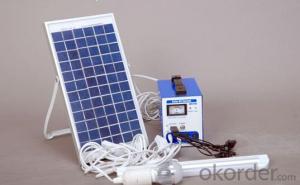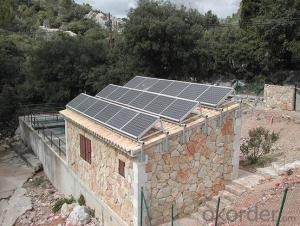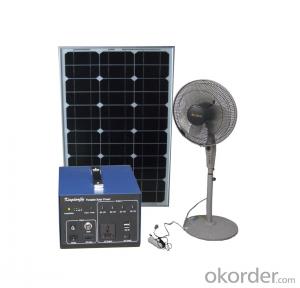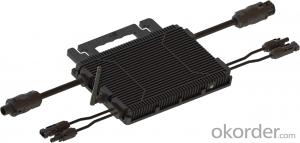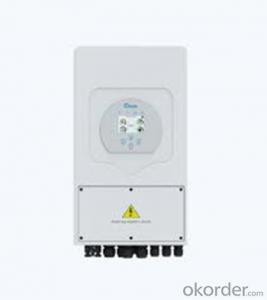CNBM Solar Home System Roof System Capacity-20W-3
- Loading Port:
- Shanghai
- Payment Terms:
- TT or LC
- Min Order Qty:
- 10 m
- Supply Capability:
- 30000 m/month
OKorder Service Pledge
OKorder Financial Service
You Might Also Like
Introduction of Solar Home System
Solar Home System is composed by Solar Panels, Inverters, Charger Controller, Battery, Cable, Mounting Bracket, which is applied to produce electricity for home use.
Solar Home System is quite suitable product in urban area and the place which is short of electricity. Our Small Solar Home System own great benifits compare with other kind electricity resources:
Electricity generating cost of Solar Home System is much cheaper than diesel engine. Beside low electricity making cost, solar system products also have the features of noiseless, clean energy, environmentally friendly and can access to many different electric appliance.
Working Principle of Solar Home System
The stand alone Solar Home System is an off-grid solar system which uses batteries to store the solar energy. Stand alone solar system solutions design for those who are not able or willing to connect to electricity grid.
However, our on-grid solar home system can be connected to the grid for utilization of grid electricity power. Our solar system can add relative equipment as our customer’s requirement which have the function of switching to city electricity automatically. The solar system can use battery power in priority, if sunshine is not so good or loads consumption is too high which cause battery power insufficient. Then system can switch automatically to grid power supply. Meanwhile, the system can charge the batteries with grid power until batteries are fully charged. Then the solar system will switch back to battery power supply.
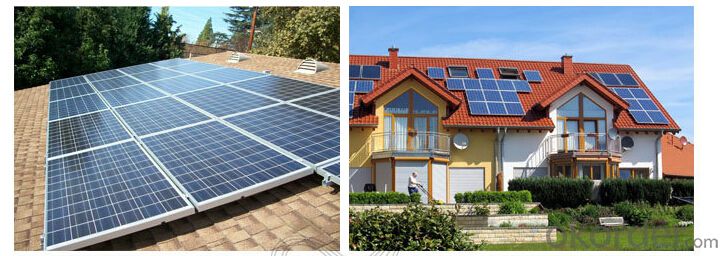


Advantage of Our Solar Home System
1 Excellent Performance: Our Solar Home System is composed by Brand Standard Kits with high quality. Our solar system has the advantage of high efficiency and stable operation. We can ensure our product with a long life period.
2. Small Orders Accepted: We can accept small orders as our customer’s trial order.
3. Warehouse: We have warehouse overseas which can bring great convenience to our customer to pick up the products.
Terms and Conditions
1. Trade terms: FOB Shanghai
2. Payment terms: 30% T/T, balanced before shipment/ LC at sight before shipment. Actual Terms can be negotiated for big order.
3. Package: Exported standard package suitable for tough handling and sea transport.
4. Delivery: Goods to be ready within 10~30 days depending on order quantity.
5. Warranty: 10 years for solar panel, 2 years for controller/inverter/battery.
- Q:How do solar energy systems impact the local economy?
- Solar energy systems can have a positive impact on the local economy in several ways. Firstly, the installation and maintenance of these systems create job opportunities, stimulating employment and income growth within the community. Additionally, the use of solar energy reduces reliance on imported fossil fuels, leading to energy cost savings for businesses and households. This, in turn, allows individuals and companies to allocate more resources towards other sectors of the economy and encourages local entrepreneurship. Finally, the development of solar energy infrastructure can attract investment and promote sustainable economic development, positioning the community as a leader in renewable energy technology.
- Q:Can solar energy systems be used in areas with limited space?
- Yes, solar energy systems can be used in areas with limited space. There are various options available such as rooftop solar panels, solar carports, and even solar-powered windows, which can effectively harness solar energy in compact spaces. Additionally, advancements in technology have led to the development of smaller and more efficient solar panels, allowing for installation in areas with limited surface area.
- Q:How do solar energy systems affect electricity bills?
- Solar energy systems can significantly reduce electricity bills by generating renewable energy from the sun. By using solar panels to harness solar energy, households can generate their own electricity and become less reliant on the grid. This can lead to substantial savings on monthly bills, as the energy produced by the solar system offsets the need for electricity from the utility company. In some cases, solar energy systems can even result in net metering, where excess energy generated is fed back into the grid, further reducing or eliminating electricity bills altogether.
- Q:How do solar energy systems impact the affordability of electricity?
- Solar energy systems can have a positive impact on the affordability of electricity by reducing or eliminating the need for traditional grid electricity. By harnessing the power of the sun, solar energy systems can generate electricity for homes and businesses, reducing reliance on expensive fossil fuels. This can help lower electricity bills and provide long-term cost savings, making electricity more affordable for consumers. Additionally, some countries offer incentives such as tax credits or feed-in tariffs, further reducing the overall cost of solar energy systems and making them even more financially viable for individuals and communities.
- Q:Can solar energy systems be used in powering agricultural processing facilities?
- Yes, solar energy systems can be used to power agricultural processing facilities. Solar energy systems, such as photovoltaic (PV) panels, can generate electricity from sunlight, which can then be used to power various electrical equipment and processes in agricultural processing facilities. This can include powering machinery used for cleaning, sorting, and packaging agricultural products, as well as running heating, ventilation, and air conditioning systems. Solar energy systems can also be integrated with battery storage solutions to provide a reliable and continuous power supply, even during periods of low sunlight or at night. Additionally, using solar energy to power agricultural processing facilities can help reduce reliance on fossil fuels, lower greenhouse gas emissions, and contribute to a more sustainable and environmentally friendly operation.
- Q:Can solar energy systems be used for powering electric vehicle taxi services?
- Yes, solar energy systems can be used to power electric vehicle taxi services. By installing solar panels on the roofs of taxi stations or charging stations, the energy generated can be used to charge electric vehicles. This not only reduces the carbon footprint of the taxi service but also lowers the operational costs by utilizing renewable energy.
- Q:Can solar energy systems be installed on parking lots or carports?
- Yes, solar energy systems can be installed on parking lots or carports. In fact, these locations offer ample space for solar panel installations, allowing for the generation of clean and renewable energy while also providing shade for parked vehicles. This dual-purpose use of space is increasingly popular and beneficial in terms of reducing carbon emissions and utilizing underutilized areas for sustainable energy production.
- Q:How do solar energy systems impact global warming?
- Solar energy systems have a positive impact on global warming as they produce clean and renewable energy, significantly reducing greenhouse gas emissions. By harnessing the power of the sun, solar systems help to mitigate climate change by displacing fossil fuel-based energy sources, which are major contributors to global warming.
- Q:What is the lifespan of solar batteries used in solar energy systems?
- The lifespan of solar batteries used in solar energy systems typically ranges from 5 to 15 years, depending on the quality of the battery and how well it is maintained.
- Q:Can solar energy systems be used in residential apartments or multi-story buildings?
- Yes, solar energy systems can certainly be used in residential apartments or multi-story buildings. In fact, they are increasingly being integrated into such settings as a viable and sustainable energy solution. Solar panels can be installed on the rooftops of these buildings to harness the sun's energy and convert it into electricity. This electricity can then be used to power various appliances, lighting, and other electrical devices within the apartments or building. Additionally, solar energy systems can also be designed to store excess energy for later use or even feed it back into the grid, allowing residents to benefit from net metering. While the feasibility of installing solar panels in these settings may vary depending on factors like available roof space and building orientation, advances in technology have made it easier and more affordable to implement solar energy systems in residential apartments and multi-story buildings.
1. Manufacturer Overview |
|
|---|---|
| Location | |
| Year Established | |
| Annual Output Value | |
| Main Markets | |
| Company Certifications | |
2. Manufacturer Certificates |
|
|---|---|
| a) Certification Name | |
| Range | |
| Reference | |
| Validity Period | |
3. Manufacturer Capability |
|
|---|---|
| a)Trade Capacity | |
| Nearest Port | |
| Export Percentage | |
| No.of Employees in Trade Department | |
| Language Spoken: | |
| b)Factory Information | |
| Factory Size: | |
| No. of Production Lines | |
| Contract Manufacturing | |
| Product Price Range | |
Send your message to us
CNBM Solar Home System Roof System Capacity-20W-3
- Loading Port:
- Shanghai
- Payment Terms:
- TT or LC
- Min Order Qty:
- 10 m
- Supply Capability:
- 30000 m/month
OKorder Service Pledge
OKorder Financial Service
Similar products
New products
Hot products
Hot Searches
Related keywords
